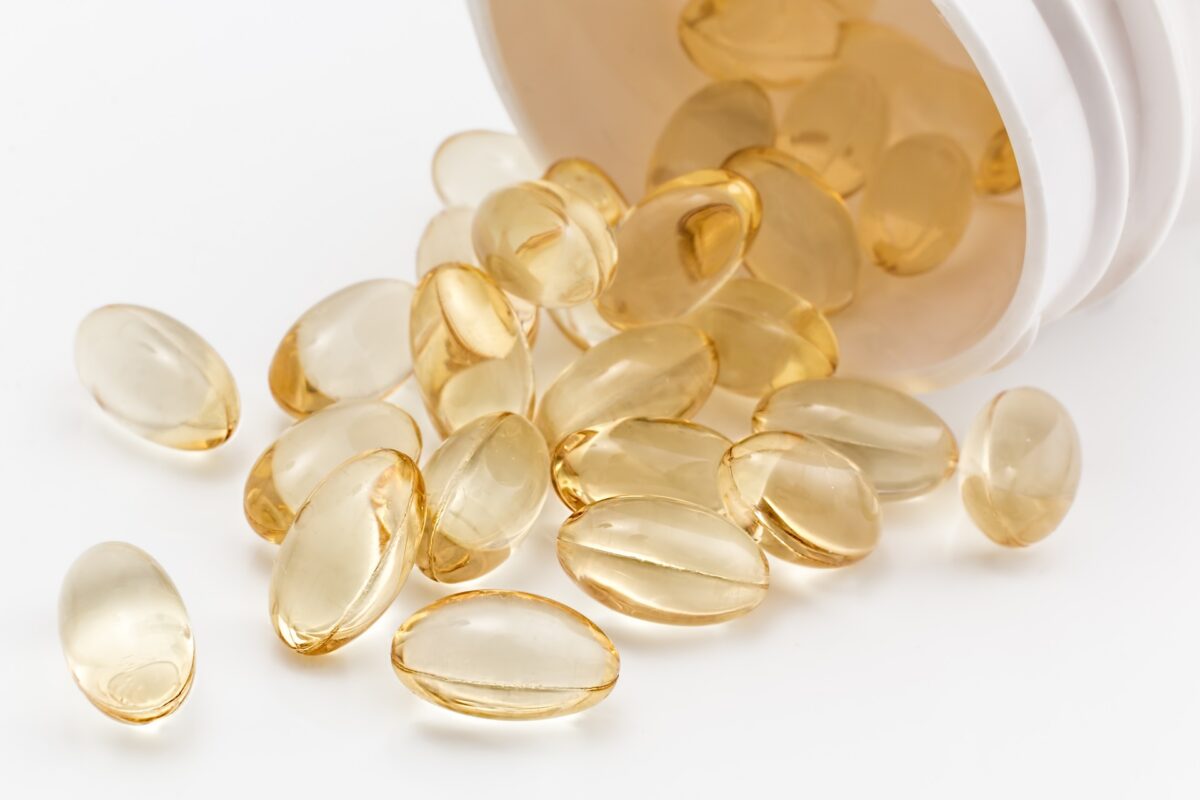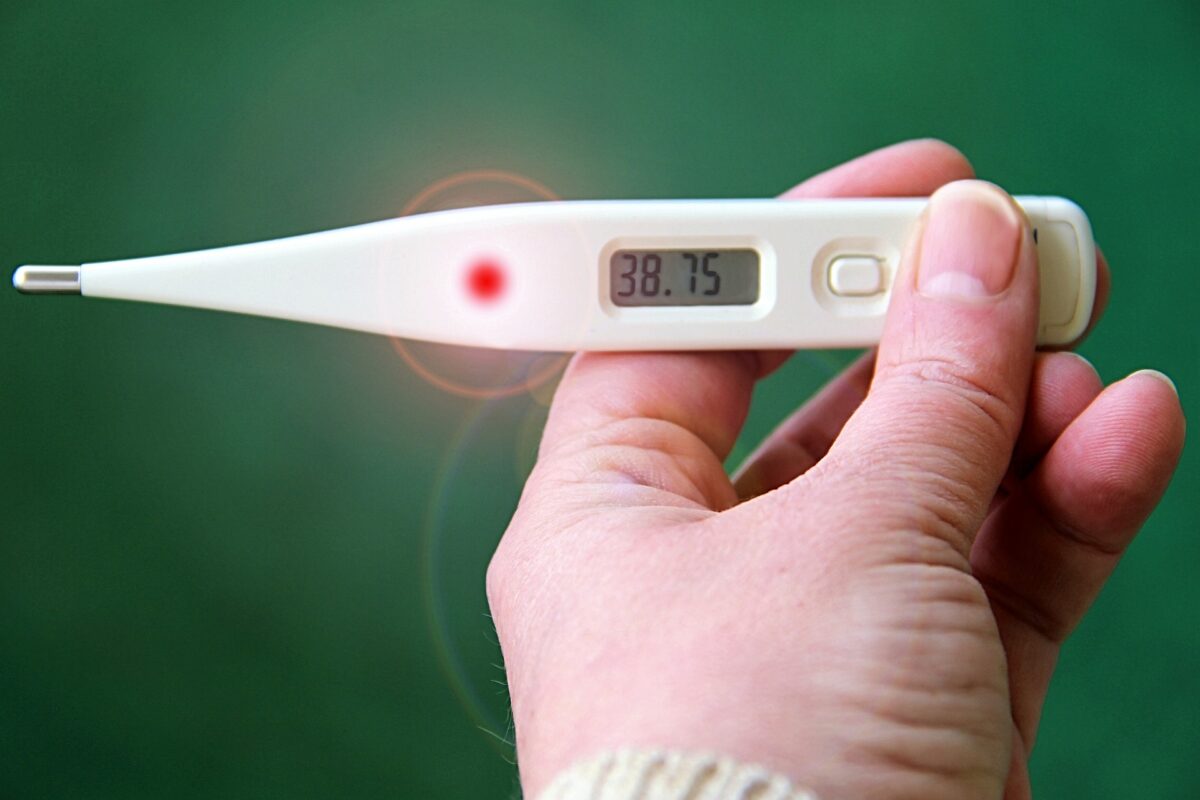It’s that time of year again—cold and flu season is in full swing. This year we have 3 major culprits to worry about: RSV (Respiratory Syncytial Virus), COVID-19 and Influenza. As a parent, it can be difficult to know when your child’s cold or flu is serious enough to warrant a trip to the hospital. After all, you don’t want to overreact and take your child to the ER for a minor illness, but you also don’t want to wait too long and risk their health. So, when should you take your child to the hospital for a cold or flu? Read on to find out.
Fever
One of the most common symptoms of both colds and flu is fever. A fever itself is not necessarily cause for alarm, but it can be a useful indicator of how serious your child’s illness is. For example, fevers caused by potentially dangerous illnesses like meningitis or sepsis will usually be quite high—usually 103 degrees Fahrenheit (39.4 celsius) or higher. In contrast, fevers caused by minor illnesses like the common cold will usually be lower—between 101 and 102 degrees Fahrenheit (38.3-38.9 celsius). Of course, every child is different, so if you’re ever unsure whether your child’s fever is cause for concern, it’s always best to err on the side of caution and give your healthcare provider a call.
Fever can be beneficial
Fever may actually be beneficial to a child as it is a natural response of the immune system that helps to fight infection. Fever increases the body’s temperature, which in turn helps to kill bacteria and viruses. It also causes the body to release more white blood cells, which helps to fight infection. In some cases, fever may even help to shorten the duration of an illness. For these reasons, it is important not to treat fever too aggressively and instead allow the body to work naturally to combat infection.
Coughing and Sneezing
Another common symptom of colds and flu is coughing and sneezing. These symptoms are usually nothing to worry about—they’re just your body’s natural response to trying to get rid of the virus. However, if your child is having difficulty breathing or their cough sounds particularly harsh or wet, this could be a sign of something more serious, like pneumonia. If you’re concerned about your child’s coughing or sneezing, it’s always best to consult with their doctor.
For minor cough and sore throat, there are many effective naturopathic options. Some of my favorites include: Elderberry syrup, honey, propolis, nin jiom herbal syrup, Ivy leaf and thyme based syrups. If a cough/sore throat is particularly bad at nighttime children’s Advil and or Benadryl can help with symptom relief; however, it is a good idea to consult your doctor prior to usage.
Body Aches
Body aches are another common symptom of both colds and flu. Usually, these aches are nothing to worry about and will go away on their own in a few days. However, if your child seems especially uncomfortable or if they’re having difficulty moving around due to pain, this could be a sign that they have something more serious like rheumatic fever. As always, if you’re concerned about your child’s health, it’s best to consult with their healthcare provider.
Conclusion
Cold and flu season can be tough for parents who want to do everything they can to keep their children healthy but don’t want to overreact every time they get a little sniffle. Hopefully this article has given you some guidance on when to take your child to the hospital for a cold or flu. Remember: if you’re ever unsure, it’s always better to err on the side of caution and give your pediatrician a call. They would be more than happy to help you figure out whether or not your child needs medical attention.
Respiratory Syncytial Virus, or RSV, is a common respiratory virus that affects infants and young children. Although RSV is usually mild, it can sometimes lead to more serious health problems, such as pneumonia. There is no specific cure for RSV, but there are several natural treatments that can help relieve symptoms and speed up recovery. Here are 7 natural treatments for RSV:
1. Honey
Honey has long been used as a natural remedy for coughs and other respiratory infections. A 2012 study found that honey was more effective than dextromethorphan, a common cough suppressant, in relieving cough symptoms. Honey can also help thin mucus and make it easier to cough up. For added effect choose Manuka honey. Manuka honey has added antibacterial, antiviral and anti-inflammatory properties. Give your child 1-2 teaspoons of honey at bedtime or as needed throughout the day. Do not give honey to infants under 12 months old.
2. Steam Inhalation
Steam inhalation is a simple and effective way to relieve congestion and coughing associated with RSV. The steam helps thin mucus and makes it easier to breathe. Fill a bowl with hot water and hold your child’s head over the bowl with a towel over their head to trap the steam. Inhale the steam for 5-10 minutes, 2-4 times per day.
3. Humidifier
Running a humidifier in your child’s room can also help relieve congestion by adding moisture to the air. Just be sure to clean the humidifier regularly to prevent the growth of mold and bacteria.
4. Salt Water Gargle
Gargling with warm salt water can help reduce inflammation and swelling in the throat, which can make it easier to eat and drink. Mix 1 teaspoon of salt in 8 ounces of warm water and have your child gargle for 30 seconds 3-4 times per day. Spit the solution out after gargling. Another good option is a saline nasal spray from you local drug store. These products can be helpful in clearing out mucus and reducing inflammation from the upper respiratory tract.
5. Rest
Getting plenty of rest is crucial for helping your child recover from RSV or any other illness. Make sure your child gets plenty of fluids and take them out only when necessary so they can focus on getting better. If your child is having trouble sleeping due to congestion, an over the counter antihistamine or decongestant can be useful in the short-term. With these products you will have to be careful about age appropriate dosing so talk to your medical or naturopathic doctor first.
6. Diet
A diet rich in fruits and vegetables may help shorten the duration of a viral infection. Vitamin C is a nutrient that is known to boost the immune system, and foods like oranges, grapefruits, and broccoli are high in this nutrient. Additionally, zinc is another mineral that is important for immunity and can be found in foods like seafood, beef, and pumpkin seeds. It is important to stay hydrated during a viral infection, so drink plenty of fluids like water, broth, and herbal teas.
7. Immune supporting supplements
There are many safe and effective immune supporting supplements for kids that can help shorten the duration of a viral infection. Some of the most popular and well-researched supplements include vitamin C, zinc, vitamin D, elderberry syrup and probiotics.
Vitamin C is a powerful antioxidant that helps support the immune system. Zinc is also important for immune health, and probiotics are beneficial bacteria that help keep the gut healthy. For more information on these supplements and more check out my post on “5 natural ways to combat cold and flu season for kids”. All of these supplements can be safely given to kids to help them fight off a virus and recover more quickly. Consult with your naturopathic doctor for appropriate dosing.
Conclusion:
RSV is a common virus that affects infants and young children, but there are several natural treatments that can help relieve symptoms and speed up recovery time. Some home remedies for RSV include honey, steam inhalation, salt water gargles, humidifiers, rest, diet and natural supplements. If you think your child may have RSV, be sure to contact their medical or naturopathic doctor right away so they can receive proper treatment.
Introduction
Manuka honey is a type of monofloral honey that is derived from the nectar of the manuka tree. This honey has been used for centuries for its medicinal properties. In recent years, it has become increasingly popular as a natural remedy for a wide variety of ailments. But with so many different types and brands of Manuka honey on the market, how do you know which one to choose?
MGO and K Factor
When it comes to choosing the best Manuka honey, there are a few things you need to keep in mind. First, you need to make sure that you are buying pure Manuka honey. This means that the honey should be sourced from bees that have only collected nectar from the manuka tree. Second, you need to look for a brand that clearly labels the methylglyoxal (MGO) content of their honey. MGO is a compound found in Manuka honey that is responsible for its antibacterial properties. The higher the MGO content, the more potent the antibacterial effects will be.
MGO is not the only compound responsible for the antibacterial properties of Manuka honey. The K factor and UMF rating is another measure of the potency of Manuka honey that takes into account the total number of methylglyoxal molecules in a given sample of honey. The higher the K factor or UMF, the more potent the antibacterial effects will be.
Type of application
Finally, you need to decide what type of Manuka honey you want. There are three main types of Manuka honey: Active, medical-grade, and cosmetic-grade. Active Manuka honey is typically used topically to treat wounds or skin infections. Medical-grade Manuka honey is sterile and can be used directly on open wounds. Cosmetic-grade Manuka honey is suitable for use in skincare products and can be used to help improve skin texture and tone.
What to use it for?
There are a number of different conditions that Manuka honey can be used to treat. Some of the most common include:
-Infections:
Manuka honey has natural antibacterial and antifungal properties that make it effective against a variety of infections. It can be used to treat everything from minor skin infections to more serious illnesses like pneumonia.
-H.Pylori:
Manuka honey has been shown to be effective against H.Pylori infection and gastric ulcers. A study published in the journal “BMC Complementary and Alternative Medicine” found that Manuka honey was able to inhibit the growth of H.Pylori bacteria. Additionally, a study published in the journal “Digestive Diseases and Sciences” found that Manuka honey was able to improve symptoms of gastric ulcers.
-Allergies:
Manuka honey has been shown to be effective in treating allergies. It helps to reduce inflammation and congestion, and can also help to soothe irritated throats.
-Digestive problems:
Manuka honey is a natural probiotic, meaning it helps to promote healthy digestion. It can be helpful in treating a variety of digestive problems, such as constipation, diarrhea, and indigestion.
-Wound healing:
Manuka honey has been shown to speed up wound healing times, both internally and externally. It helps to reduce inflammation and bacteria levels at the wound site, which can promote faster healing.
Conclusion:
The three things to look for when purchasing Manuka honey are purity, MGO content, and type. Manuka honey is effective for a variety of conditions, such as infections, allergies, digestive problems, and wound healing. Buying a honey that has been certified as pure and has a high MGO content will ensure that you’re getting the best possible product for your needs.
Cold and Flu season is here! Now that kids are back to school and the season is changing we should start thinking about preventing colds and flu. As a Naturopathic Doctor part of my job is counseling parents on safe and effective ways to treat and prevent colds and flu for the whole family. Here are 5 things that will help prevent colds and flu and can even help to ameliorate symptoms and shorten duration of an active infection.
-
Probiotics
Probiotics help boost the immune system – Studies have shown that probiotics affect immune cells throughout the body. When certain strains of probiotics are introduced into our intestine they help to repair intestinal cells and they boost production of antimicrobial substances. In one study, 326 children aged 3-5 years were randomly assigned to receive, in double-blind fashion, probiotic supplementation. Treatments were given twice per day in divided doses for 6 months, including the winter season. Compared with placebo, the probiotic group had the following results; fever reduction 53-73%, cough reduction 41-62%, decreased runny nose 28-59%, decreased need for antibiotics 68-82%, reduced absence from school 28-32%.
-
Elderberry
Elderberry extracts inhibit bacteria and viruses – Not only does elderberry syrup taste great, studies have shown that it inhibits the bacteria and viruses associated with common colds and the flu. One study demonstrated that an elderberry liquid extract possesses antimicrobial activity against both streptococci bacteria and influenza viruses. Another study looked at 312 air travellers flying from Australia to an overseas destination. Those travellers who took an elderberry extract before, during and after travel had fewer colds, less sick days and less symptoms.
-
Vitamin C
Vitamin C supports immune cells – Vitamin C is very important for optimal immune system functioning. Vitamin C helps immune cells get to where they need to be, kill pathogens effectively, protect the body from damage and clean up after battling infections. Studies have shown that adequate vitamin C in the blood helps prevent infections, is necessary to fight infections and helps with recovery. The recommended daily intake of vitamin C is 100-200mg/day; however during active infection, the metabolic demand increases and therefore the requirement for vitamin C is likely to be higher. Even in this day and age, vitamin C is the fourth leading nutrient deficiency in North America. Poor diet and increases in free radical exposure due to an unhealthy lifestyle may be contributing factors. Excellent sources of vitamin C are Broccoli, Citrus Fruits and Berries.
-
Zinc
Zinc is essential for immune system communication – The importance of zinc for proper immune function has been well established. Zinc deficiency undoubtedly causes immune system malfunction. The cells of our body are in constant communication. During infection there is a need for effective communication between immune cells in order to get rid of the “bad guys”. Communication happens in the form of chemical messengers and enzymes. Zinc is an essential component of these chemicals and enzymes. As with vitamin C, during active infection our requirement for zinc is likely to increase. Studies have shown that Zinc supplementation during infection can shorten the duration of the illness. Excellent dietary sources of zinc include: Meat, Shellfish, Legumes, Nuts and Seeds. Supplementation may be important with a vegan or vegetarian diet.
-
Vitamin D
Vitamin D is the supervisor of the immune system –Vitamin D has many functions in the body, and receptors for vitamin D can be found on many different tissues. One important function for vitamin D is in the modulation of our immune system. Studies have suggested that vitamin D is able to both calm down and rev-up the immune system according to what our body needs it to do. This is why Vitamin D is thought to be as important in autoimmune disorders as it is in infections.
Vitamin D deficiency can cause the immune system to behave erratically. Unfortunately in Canada we have one of the highest incidences of vitamin D deficiency in the world. Our primary source of vitamin D is from sunlight and therefore supplementation becomes important especially during the winter months. Studies have shown that there is a higher incidence of upper respiratory tract infections in athletes who are deficient in the vitamin and who train in the wintertime. Supplementation had preventative and symptom reducing effects. Aside from sunlight, some dietary sources of vitamin D are: fortified foods, fatty fish, beef liver, egg yolks and cheese.
Even vitamins and minerals at high dosages can be dangerous, especially in children. It is always recommended to consult with a health care professional, such as a Naturopathic Doctor, before supplementing on your own.
[button size=”btn-large” link=”https://doctorshawn.ca/contact-us/” target=”_blank” ]Book an appointment today![/button]
Leyer, GJ et al. Probiotic effects on cold and influenza-like symptom incidence and duration in children. Pediatrics 2009; 124-179. Walker, WA. Mechanisms of action of probiotics. Clin Infect Dis. 2008; 46 (Suppl2): S87-91.
Curr Opin Gastroenterol. 2011 October ; 27(6): 496–501. doi:10.1097/MOG.0b013e32834baa4d. Probiotics and immune health Fang Yana and D.B. Polkb,c,d
Elderberry Supplementation Reduces Cold Duration
and Symptoms in Air-Travellers: A Randomized,
Double-Blind Placebo-Controlled Clinical Trial Evelin Tiralongo 1,2, *, Shirley S. Wee 2,3 and Rodney A. Lea 4 Received: 8 February 2016; Accepted: 18 March 2016; Published: 24 March 2016
Krawitz et al. BMC Complementary and Alternative Medicine 2011, 11:16
http://www.biomedcentral.com/1472-6882/11/16
Inhibitory activity of a standardized elderberry
liquid extract against clinically-relevant human
respiratory bacterial pathogens and influenza A
and B viruses Christian Krawitz1†, Mobarak Abu Mraheil1†, Michael Stein2, Can Imirzalioglu1, Eugen Domann1, Stephan Pleschka2*,
Torsten Hain1*
Vitamin C and Immune Function Anitra C. Carr 1, * and Silvia Maggini 2
1 Department of Pathology, University of Otago, Christchurch, P.O. Box 4345, Christchurch 8140, New Zealand
2 Bayer Consumer Care Ltd., Peter-Merian-Strasse 84, 4002 Basel, Switzerland; silvia.maggini@bayer.com* Correspondence: anitra.carr@otago.ac.nz; Tel.: +643-364-0649 Received: 21 September 2017; Accepted: 31 October 2017; Published: 3 November 2017
Biofactors. 2014 Jan-Feb;40(1):27-40. doi: 10.1002/biof.1114. Epub 2013 Jun 27.Zinc signals and immune function. Haase H1, Rink L.
Cochrane Database Syst Rev. 2013 Jun 18;(6):CD001364. doi: 10.1002/14651858.CD001364.pub4. Zinc for the common cold.
Vitamin D3 Supplementation Reduces the Symptoms
of Upper Respiratory Tract Infection during Winter
Training in Vitamin D-Insufficient Taekwondo
Athletes: A Randomized Controlled Trial Hyun Chul Jung 1 , Myong-Won Seo 2 , Sukho Lee 3 , Sung Woo Kim 2 and Jong Kook Song 2, * 1 Department of Kinesiology, College of Health Sciences, University of Louisiana at Monroe, 700 University
Avenue, Monroe, LA 71209, USA; jung@ulm.edu
2 Department of Taekwondo, College of Physical Education, Kyung Hee University, 1732 Deokyoungdaero, Giheung-gu, Yongin-si, Gyeonggi-do 17014, Korea; smilly1004@khu.ac.kr (M.-W.S.); kswrha@khu.ac.kr (S.W.K.)
3 Department of Counseling, Health, and Kinesiology, College of Education and Human Development,Texas A&M University-San Antonio, One University Way, San Antonio, TX 78224, USA; slee@tamusa.edu* Correspondence: jksong@khu.ac.kr; Tel.: +82-31-201-2708 Received: 2 August 2018; Accepted: 10 September 2018; Published: 14 September 2018
Mechanisms Underlying the Regulation of Innate and
Adaptive Immunity by Vitamin D Ran Wei and Sylvia Christakos *
Received: 25 June 2015 ; Accepted: 15 September 2015 ; Published: 24 September 2015 Department of Microbiology, Biochemistry and Molecular Genetics, New Jersey Medical School, Rutgers, the State University of New Jersey, 185 South Orange Ave, Newark, NJ 07103, USA; weira@njms.rutgers.edu
* Correspondence: christak@njms.rutgers.edu; Tel.: +973-972-4033; Fax: +973-972-5594












